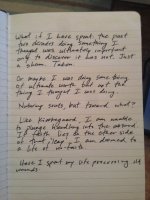The pastor who tried living without God for a year now says he's no longer a believer. I couldn't find the old thread on it.
After Year Of Atheism, Former Pastor: 'I Don't Think God Exists'
That's a pretty amazing statement.
I honestly don't know what to think of this. Part of me says, "yay!" but it all seems too pat. Maybe I'll read more of his blog later and hopefully get a better sense of his experience.
After Year Of Atheism, Former Pastor: 'I Don't Think God Exists'
(Emphasis mine.)Now he thinks certainty is a bit overrated.
"I think before I wanted a closer relationship to God and today I just want a closer relationship with reality," Bell says.
That's a pretty amazing statement.
I honestly don't know what to think of this. Part of me says, "yay!" but it all seems too pat. Maybe I'll read more of his blog later and hopefully get a better sense of his experience.

